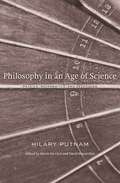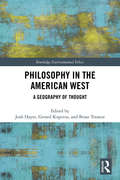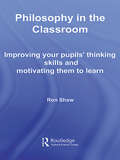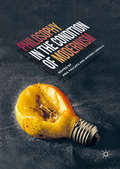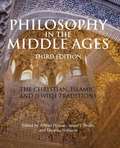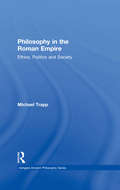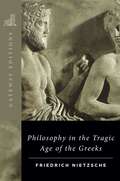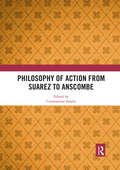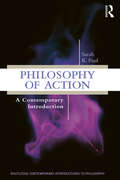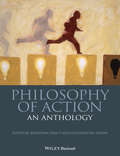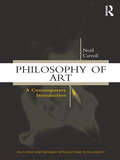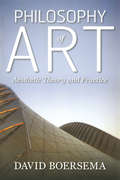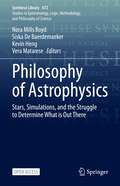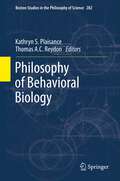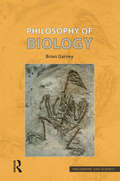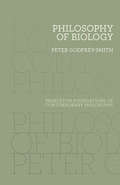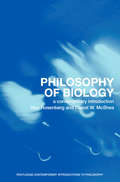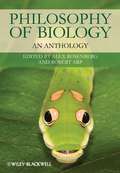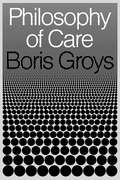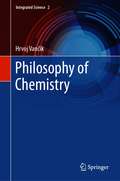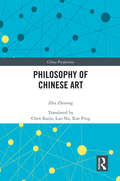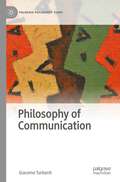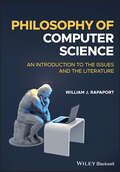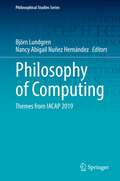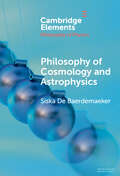- Table View
- List View
Philosophy in an Age of Science: Physics, Mathematics, and Skepticism
by Hilary PutnamHilary Putnam's unceasing self-criticism has led to the frequent changes of mind he is famous for, but his thinking is also marked by considerable continuity. A simultaneous interest in science and ethics unusual in the current climate of contention has long characterized his thought.
Philosophy in the American West: A Geography of Thought (Routledge Environmental Ethics)
by Josh Hayes Brian Treanor Gerard KuperusPhilosophy in the American West explores the physical, ecological, cultural, and narrative environments associated with the western United States, reflecting on the relationship between people and the places that sustain them. The American West has long been recognized as having significance. From Crèvecoeur’s early observations in Letters from an American Farmer (1782), to Thoreau’s reflections in Walden (1854), to twentieth-century thoughts on the legacy of a vanishing frontier, "the West" has played a pivotal role in the American narrative and in the American sense of self. But while the nature of "westernness" has been touched on by historians, sociologists, and, especially, novelists and poets, this collection represents the first attempt to think philosophically about the nature of "the West" and its influence on us. The contributors take up thinkers that have been associated with Continental Philosophy and pair them with writers, poets, and artists of "the West". And while this collection seeks to loosen the cords that tie philosophy to Europe, the traditions of "continental" philosophy—phenomenology, hermeneutics, deconstruction, and others—offer deep resources for thinking through the particularity of place. This book will be of great interest to students and scholars of Philosophy, as well as those working in Ecocriticism and the Environmental Humanities more broadly.
Philosophy in the Classroom: Improving your Pupils' Thinking Skills and Motivating Them to Learn
by Ron ShawEver had difficulty inspiring your children to consider and discuss philosophical concepts? Philosophy in the Classroom helps teachers tap in to children’s natural wonder and curiosity. The practical lesson plans, built around Aesop’s fables, encourage children to formulate and express their own points of view, enabling you to lead rich and rewarding philosophical discussions in the primary classroom. This highly practical and engaging classroom companion: prompts students to consider serious moral issues in an imaginative and stimulating way uses Aesop's fables as a springboard to pose challenging questions about the issues raised provides fifteen key themes including happiness, wisdom, self-reliance and judging others as the basis for classroom discussion. uses powerful and creative drawings to illustrate activities and photocopiable resources. Philosophy in the Classroom is an invaluable resource for any primary school teacher wanting to engage their students in meaningful philosophical reflection and discussion. Ron Shaw has many years of classroom experience and is the author of more than forty books helping primary and secondary school students to improve their thinking skills.
Philosophy in the Condition of Modernism
by Ana Falcato Antonio CardielloProduced on the fringes of philosophy and literary criticism, this book is a pioneering study which aims to explicitly address and thematize what may be called a “critical philosophy in the condition of modernism”. Its most important and original contribution to both disciplines is a self-conscious reflection on possible modes of writing philosophy today, and a systematic comparison with what happened in literary modernism at the beginning of the twentieth-century. The volume is divided into six sections, where internationally renowned scholars discuss such pressing topics as the role of an unreliable narrator in a major philosophical treatise, the different mediums of art-production and how these impact on our perception of the Work itself, the role of narrative in animal ethics and the filmic adaption of a Modernist classic.
Philosophy in the Middle Ages: The Christian, Islamic, and Jewish Traditions
by Thomas Williams James J. Walsh Arthur HymanThomas Williams' revision of Arthur Hyman and James J. Walsh's classic compendium of writings in the Christian, Islamic, and Jewish medieval philosophical traditions expands the breadth of coverage that helped make its predecessor the best known and most widely used collection of its kind.The third edition builds on the strengths of the second by preserving its essential shape while adding several important new texts--including works by Augustine, Boethius, Pseudo-Dionysius the Areopagite, Anselm, al-Farabi, al-Ghazali, Ibn Rushd, Bonaventure, Thomas Aquinas, and John Duns Scotus--and featuring new translations of many others.The volume has also been redesigned and its bibliographies updated with the needs of a new generation of students in mind.
Philosophy in the Roman Empire: Ethics, Politics and Society (Ashgate Ancient Philosophy Series)
by Michael TrappDrawing on unusually broad range of sources for this study of Imperial period philosophical thought, Michael Trapp examines the central issues of personal morality, political theory, and social organization: philosophy as the pursuit of self-improvement and happiness; the conceptualization and management of emotion; attitudes and obligations to others; ideas of the self and personhood; constitutional theory and the ruler; the constituents and working of the good community. Texts and thinkers discussed range from Alexander of Aphrodisias, Aspasius and Alcinous, via Hierocles, Seneca, Musonius, Epictetus, Plutarch and Diogenes of Oenoanda, to Dio Chrysostom, Apuleius, Lucian, Maximus of Tyre, Pythagorean pseudepigrapha, and the Tablet of Cebes. The distinctive doctrines of the individual philosophical schools are outlined, but also the range of choice that collectively they presented to the potential philosophical 'convert', and the contexts in which that choice was encountered. Finally Trapp turns his attention to the status of philosophy itself as an element of the elite culture of the period, and to the ways in which philosophical values may have posed a threat to other prevalent schemes of value; Trapp argues that the idea of 'philosophical opposition', though useful, needs to be substantially modified and extended.
Philosophy in the Tragic Age of the Greeks
by Friedrich Wilhelm Nietzsche Marianne CowanFor Nietzsche the Age of Greek Tragedy was indeed a tragic age. He saw in it the rise and climax of values so dear to him that their subsequent drop into catastrophe (in the persons of Socrates-Plato) was as clearly Foreshadowed as though these were events taking place in the theater.And so in this work, unpublished in his own day but written at the same time that his The Birth of Tragedy had so outraged the German professorate as to imperil his own academic career, his most deeply felt task was one of education. He wanted to present the culture of the Greeks a paradigm to his young German contemporaries who might thus be persuaded to work toward a state of culture of their own; a state which Nietzsche found sorely missing.-From the Introduction by Marianne Cowan
Philosophy of Action from Suarez to Anscombe
by Constantine SandisAccounts of human and animal action have been central to modern philosophy from Suarez and Hobbes in the sixteenth century to Wittgenstein and Anscombe in the mid-twentieth century via Locke, Hume, Kant, and Hegel, among many others. Philosophies of action have thus greatly influenced the course of both moral philosophy and the philosophy of mind. This book gathers together specialists from both the philosophy of action and the history of philosophy with the aim of re-assessing the wider philosophical impact of action theory. It thereby explores how different notions of action, agency, reasons for action, motives, intention, purpose, and volition have affected modern philosophical understandings of topics as diverse as those of human nature, mental causation, responsibility, free will, moral motivation, rationality, normativity, choice and decision theory, criminal liability, weakness of will, and moral and social obligation. In so doing, it reinterprets the history of modern philosophy through the lens of action theory while also tracing the origins of contemporary questions in the philosophy of action back across half a millennium. This book was originally published as a special issue of Philosophical Explorations.
Philosophy of Action: A Contemporary Introduction (Routledge Contemporary Introductions to Philosophy)
by Sarah PaulThis book offers an accessible and inclusive overview of the major debates in the philosophy of action. It covers the distinct approaches taken by Donald Davidson, G.E.M. Anscombe, and numerous others to answering questions like "what are intentional actions?" and "how do reasons explain actions?". Further topics include intention, practical knowledge, weakness and strength of will, self-governance, and collective agency. With introductions, conclusions, and annotated suggested reading lists for each of the 10 chapters, it is an ideal introduction for advanced undergraduates as well any philosopher seeking a primer on these issues.
Philosophy of Action: An Anthology (Blackwell Philosophy Anthologies)
by Constantine Sandis Jonathan DancyThe Philosophy of Action: An Anthology is an authoritative collection of key work by top scholars, arranged thematically and accompanied by expert introductions written by the editors. This unique collection brings together a selection of the most influential essays from the 1960s to the present day. An invaluable collection that brings together a selection of the most important classic and contemporary articles in philosophy of action, from the 1960’s to the present day No other broad-ranging and detailed coverage of this kind currently exists in the field Each themed section opens with a synoptic introduction and includes a comprehensive further reading list to guide students Includes sections on action and agency, willing and trying, intention and intentional action, acting for a reason, the explanation of action, and free agency and responsibility Written and organised in a style that allows it to be used as a primary teaching resource in its own right
Philosophy of Art: A Contemporary Introduction (Routledge Contemporary Introductions to Philosophy)
by Noël CarrollPhilosophy of Art is a textbook for undergraduate students interested in the topic of philosophical aesthetics.It introduces the techniques of analytic philosophy as well as key topics such as the representational theory of art, formalism, neo-formalism, aesthetic theories of art, neo-Wittgensteinism, the Institutional Theory of Art. as well as historical approaches to the nature of art.Throughout, abstract philosophical theories are illustrated by examples of both traditional and contemporary art including frequent reference to the avant-garde in this way enriching the readers understanding of art theory as well as the appreciation of art.Unique features of the textbook are:* chapter summaries* summaries of major theories of art and suggested analyses of the important categories used when talking and thinking of art* annotated suggested readings at the ends of chapters.
Philosophy of Art: Aesthetic Theory and Practice
by David BoersemaWith the sustained, coherent perspective of an authored text and the diverse, authoritative views typical of an anthology,Philosophy of Art: Aesthetic Theory and Practice by David Boersema provides the context and commentary students need to comprehend the various issues in philosophy of art. Throughout the book, issues are examined using the lenses of the three broad areas of philosophy: metaphysics, epistemology, and value theory. That is, concerns are raised about what is expressed, how it is expressed, and why it is expressed. Chapters on the artist, the audience, and the artwork further break down the discipline and are applied to the final chapters on the specific types of art. The differences between art and science as well as the relationship of art and society provide a refreshing discussion of overlooked areas in philosophy of art.
Philosophy of Astrophysics: Stars, Simulations, and the Struggle to Determine What is Out There (Synthese Library #472)
by Kevin Heng Nora Mills Boyd Siska De Baerdemaeker Vera MatareseThis is an open access book. This book, the first edited collection of its kind, explores the recent emergence of philosophical research in astrophysics. It assembles a variety of original essays from scholars who are currently shaping this field, and it combines insightful overviews of the current state of play with novel, significant contributions. It therefore provides an ideal source for understanding the current debates in philosophy of astrophysics, and it offers new ideas for future cutting-edge research. The selection of essays offered in this book addresses methodological and metaphysical questions that target a wide range of topics, including dark matter, black holes, astrophysical observations and modelling.The book serves as the first standard resource in philosophy of astrophysics for all scholars who work in the field and want to expand or deepen their knowledge, but it also provides an accessible guide for all those philosophers and scientists who are interested in getting a first, basic understanding of the main issues in philosophy of astrophysics.
Philosophy of Behavioral Biology
by Thomas A.C. Reydon Kathryn S. PlaisanceThis volume provides a broad overview of issues in the philosophy of behavioral biology, covering four main themes: genetic, developmental, evolutionary, and neurobiological explanations of behavior. It is both interdisciplinary and empirically informed in its approach, addressing philosophical issues that arise from recent scientific findings in biological research on human and non-human animal behavior. Accordingly, it includes papers by professional philosophers and philosophers of science, as well as practicing scientists. Much of the work in this volume builds on presentations given at the international conference, "Biological Explanations of Behavior: Philosophical Perspectives", held in 2008 at the Leibniz Universität Hannover in Germany. The volume is intended to be of interest to a broad range of audiences, which includes philosophers (e.g., philosophers of mind, philosophers of biology, and metaethicists), as well as practicing scientists, such as biologists or psychologists whose interests relate to biological explanations of behavior.
Philosophy of Biology (Philosophy And Science Ser. #1)
by Brian GarveyThis major new series in the philosophy of science aims to provide a new generation of textbooks for the subject. The series will not only offer fresh treatments of core topics in the theory and methodology of scientific knowledge, but also introductions to newer areas of the discipline. Furthermore, the series will cover topics in current science that raise significant foundational issues both for scientific theory and for philosophy more generally. Biology raises distinct questions of its own not only for philosophy of science, but for metaphysics, epistemology and ethics. This comprehensive new textbook for a rapidly growing field of study provides students new to the subject with an up-to-date presentation of the key philosophical issues. Care is taken throughout to keep the technicalities accessible to the non-biologist but without sacrificing the philosophical subtleties. The first part of the book covers the philosophical challenges posed by evolution and evolutionary biology, beginning with Darwin's central argument in the Origin of the Species. Individual chapters cover natural selection, the selfish gene, alternative units of selection, developmental systems theory, adaptionism and issues in macroevolution. The second part of the book examines philosophical questions arising in connection with biological traits, function, nature and nurture, and biological kinds. The third part of the book examines metaphysical questions, biology's relation with the traditional concerns of philosophy of science, and how evolution has been introduced into epistemological debates. The final part considers the relevance of biology to questions about ethics, religion and human nature.
Philosophy of Biology (Princeton Foundations of Contemporary Philosophy #8)
by Peter Godfrey-SmithAn essential introduction to the philosophy of biologyThis is a concise, comprehensive, and accessible introduction to the philosophy of biology written by a leading authority on the subject. Geared to philosophers, biologists, and students of both, the book provides sophisticated and innovative coverage of the central topics and many of the latest developments in the field. Emphasizing connections between biological theories and other areas of philosophy, and carefully explaining both philosophical and biological terms, Peter Godfrey-Smith discusses the relation between philosophy and science; examines the role of laws, mechanistic explanation, and idealized models in biological theories; describes evolution by natural selection; and assesses attempts to extend Darwin's mechanism to explain changes in ideas, culture, and other phenomena. Further topics include functions and teleology, individuality and organisms, species, the tree of life, and human nature. The book closes with detailed, cutting-edge treatments of the evolution of cooperation, of information in biology, and of the role of communication in living systems at all scales.Authoritative and up-to-date, this is an essential guide for anyone interested in the important philosophical issues raised by the biological sciences.
Philosophy of Biology: A Contemporary Introduction (Routledge Contemporary Introductions to Philosophy)
by Alex Rosenberg Daniel W. McSheaIs life a purely physical process? What is human nature? Which of our traits is essential to us? In this volume, Daniel McShea and Alex Rosenberg – a biologist and a philosopher, respectively – join forces to create a new gateway to the philosophy of biology; making the major issues accessible and relevant to biologists and philosophers alike. Exploring concepts such as supervenience; the controversies about genocentrism and genetic determinism; and the debate about major transitions central to contemporary thinking about macroevolution; the authors lay out the broad terms in which we should assess the impact of biology on human capacities, social institutions and ethical values.
Philosophy of Biology: An Anthology
by Robert Arp Alex RosenbergBy combining excerpts from key historical writings with editors' introductions and further reading material, Philosophy of Biology: An Anthology offers a comprehensive, accessible, and up-to-date collection of the field's most significant works. Addresses central questions such as 'What is life?' and 'How did it begin?', and the most current research and arguments on evolution and developmental biology Editorial notes throughout the text define, clarify, and qualify ideas, concepts and arguments Includes material on evolutionary psychology and evolutionary developmental biology not found in other standard philosophy of biology anthologies Further reading material assists novices in delving deeper into research in philosophy of biology
Philosophy of Care
by Boris GroysRetracing the philosophical discussions around careOur current culture is dominated by the ideology of creativity. One is supposed to create the new and not to care about the things as they are. This ideology legitimises the domination of the &“creative class&” over the rest of the population that is predominantly occupied by forms of care – medical care, child care, agriculture, industrial maintenance and so on. We have a responsibility to care for our own bodies, but here again our culture tends to thematize the bodies of desire and to ignore the bodies of care – ill bodies in need of self-care and social care.But the discussion of care has a long philosophical tradition. The book retraces some episodes of this tradition - beginning with Plato and ending with Alexander Bogdanov through Hegel, Heidegger, Bataille and many others. The central question discussed is: who should be the subject of care? Should I care for myself or trust the others, the system, the institutions? Here, the concept of the self-care becomes a revolutionary principle that confronts the individual with the dominating mechanisms of control.
Philosophy of Chemistry (Integrated Science #2)
by Hrvoj VančikThis book, Philosophy of Chemistry, is dedicated to some of the general principles of philosophy of chemistry, the special branch of philosophy of science. Since the work is a collection of lectures that the Author gave at the University of Zagreb (Croatia) during the period of twenty years, the book could serve also as a university textbook in philosophy of chemistry. Philosophy of chemistry is represented through the discussion about some of the general philosophical problems such as, theory of complexity, autonomy of sciences, epistemology, falsificationism, emergence and unity of science, holism and reductionism, the problem of identity, and hierarchical structures, as well as the teleological aspects of science. The work consists from thirteen chapters where the main science-philosophical problems are represented and discussed within the historical context of the development of chemistry as a science. The book is aimed at wider academic audience interesting in the philosophy of science, and especially at university students of life sciences.
Philosophy of Chinese Art (China Perspectives)
by Zhu ZhirongThis title provides a systematic examination of the philosophy of Chinese art, exploring the peculiarity of artistic forms and distinctive conceptions and artistic principles of Chinese art which are grounded in the life awareness of the ancient Chinese and interconnect with the Chinese philosophy of life.Synthesizing Chinese theories of art with Western philosophical systems, the book is organized into five parts: (1) the subject, the actor who creates, appreciates, and criticizes artistic works; (2) ontological aspects, that is, the artwork per se and the dynamic process of creation; (3) aesthetic traits, the organic whole constituted by rhythm, meter, the principle of harmony, and space-time awareness; (4) artistic representation, which is manifested in the rhythm of vital energy, momentum of genre, vigour of style, and taste and inclination; and (5) the evolution of Chinese art. Based on this structural thread, the author looks into the interwoven relationship between the philosophy of Chinese art and ancient Chinese thought in terms of the spirit of life, nature–human relations, and ontological awareness of human-centredness.The book will appeal to scholars, students, and general readers interested in aesthetics, art theory, art philosophy, Chinese art, and ancient Chinese culture.
Philosophy of Communication (Palgrave Philosophy Today)
by Giacomo TurbantiBy comprehensively exploring the theoretical questions raised by professional communication, this book provides an introduction to the philosophy of communication. Key Features:Arranged in three parts encompassing the theory of communication, conflict transformation and the role communication plays within organizations. Examines how agreement is reached through communication, how such agreement is negotiated between different perspectives and how such negotiation produces our organizations. Includes a full range of pedagogical features, including study questions, essay questions. chapter summaries, focus points and suggestions for further reading. Philosophy of Communication is essential reading for all students of the philosophy of communication.
Philosophy of Computer Science: An Introduction to the Issues and the Literature
by William J. RapaportA unique resource exploring the nature of computers and computing, and their relationships to the world. Philosophy of Computer Science is a university-level textbook designed to guide readers through an array of topics at the intersection of philosophy and computer science. Accessible to students from either discipline, or complete beginners to both, the text brings readers up to speed on a conversation about these issues, so that they can read the literature for themselves, form their own reasoned opinions, and become part of the conversation by contributing their own views. Written by a highly qualified author in the field, the book looks at some of the central questions in the philosophy of computer science, including: What is philosophy? (for readers who might be unfamiliar with it) What is computer science and its relationship to science and to engineering? What are computers, computing, algorithms, and programs?(Includes a line-by-line reading of portions of Turing’s classic 1936 paper that introduced Turing Machines, as well as discussion of the Church-Turing Computability Thesis and hypercomputation challenges to it) How do computers and computation relate to the physical world? What is artificial intelligence, and should we build AIs? Should we trust decisions made by computers?A companion website contains annotated suggestions for further reading and an instructor’s manual. Philosophy of Computer Science is a must-have for philosophy students, computer scientists, and general readers who want to think philosophically about computer science.
Philosophy of Computing: Themes from IACAP 2019 (Philosophical Studies Series #143)
by Björn Lundgren Nancy Abigail Nuñez HernándezThis book features a unique selection of works presented at the 2019 annual international conference of the International Association for Computing and Philosophy (IACAP). Every contribution has been peer-reviewed, revised, and extended. The included chapters are thematically diverse; topics include epistemology, dynamic epistemic logic, topology, philosophy of science and computation, game theory and abductive inferences, automated reasoning and mathematical proofs, computer simulations, scientific modelling, applied ethics, pedagogy, human-robot interactions, and big data, algorithms, and artificial intelligence.The volume is a testament to the value of interdisciplinary approaches to the computational and informational turn. We live in a time of tremendous development, which requires rigorous reflection on the philosophical nature of these technologies and how they are changing the world. How can we understand these technologies? How do these technologies change our understanding of the world? And how do these technologies affect our place as humans in the world? These questions, and more, are addressed in this volume which is of interest to philosophers, engineers, and computer scientists alike.
Philosophy of Cosmology and Astrophysics (Elements in the Philosophy of Physics)
by Siska De BaerdemaekerCosmology and astrophysics provide a unique resource for philosophers of science: due to novel physics, the remoteness of their targets, and the range of relevant spatiotemporal scales, research in these areas pushes the methodology of empirical science to its limits. It should therefore not be surprising that philosophy of cosmology, and, to a lesser degree, philosophy of astrophysics, have seen an explosive growth over the past two decades. This Cambridge Element surveys the existing literature, identifies areas for future research, and highlights how philosophy of cosmology and astrophysics have implications for debates in general philosophy of science.
